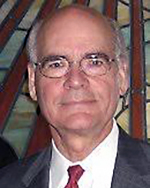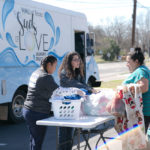With the rise of COVID-19, Texas Baptist hospital chaplains face new challenges as they minister to healthcare workers, patients and families, sharing God’s love and hope in difficult circumstances.
Beaumont reported its first confirmed positive case of COVID-19 March 18 and its first coronavirus-related death April 1.
Even before the virus was widely present in the region, hospitals began treating every person who walked through their doors as a potential carrier, said David Cross, director of Pastoral Care for Baptist Hospitals of Southeast Texas and a chaplain endorsed by Texas Baptists. Visitors were restricted and allowed to enter only in extreme circumstances.
Chaplains are unable to have direct contact with any patients who may have the virus due to insufficient supplies of personal protection equipment, such as masks.
Chaplains care for caregivers
These circumstances have led to a heavier emphasis on healthcare worker ministry, as they are the individuals on the front lines in battling COVID-19, Cross noted. Healthcare workers face a difficult workplace environment, in addition to adjusting to the same rapidly changing circumstances affecting everyone.

“There is a great deal of stress in our caregivers as they help the patients with professionalism, while also dealing with personal crises like kids at home, spouses out of work and other new difficulties,” Cross explained.
Cross has seen God’s provision. Harmony Baptist Church in Vidor donated to the hospital 19 cases containing 4,560 masks the church had on hand from Hurricane Harvey clean-up. Cross urged local Baptist associations and churches to look through their own stocks to see if they have any medical supplies that could be donated to hospitals.
In addition to the supplies, Cross also asked churches to pray for the chaplains and healthcare workers during this stressful time. He urged people to remember to thank and reach out to hospital workers—not only doctors and nurses, but also technicians, custodians and administration. They are all risking exposure to COVID-19 as they continue to serve patients, he noted. He particularly requested prayer for the senior hospital administration, who face new problems in the uncharted days ahead.
‘Real people are hurting’
In the Dallas area, COVID-19 cases already have inundated the hospitals. Mark Grace, chief of mission and ministry at Baylor Scott and White Health, explained the outbreak has moved along as it was predicted.
Sign up for our weekly edition and get all our headlines in your inbox on Thursdays
While many individuals are exceptionally open to spiritual conversations, Grace expressed deep regret about the reason behind that openness.

“Real tragedy is happening now, and I feel the weight of it. Real people are hurting. And I believe we are called to join God in responding to these tragedies with compassion and love,” he said.
Ministry to COVID-19 patients is limited to telephone calls and video visits because of infection risks. Many of the new spiritual meetings are with staff, who are facing new challenges, both at work and home. Grace explained that the situation is isolating for patients, healthcare workers and even chaplains.
“They’re engaging in a work that has become significantly more dangerous” in recent weeks, he said. “On the one hand, I’ve had lots of people reaching out and asking what they can do to help. Emails, texts and other consistent reminders of your love and prayers are needed more now than ever.
“But I’ve talked to some chaplains whose extended family members or friends are asking them not to come to their house anymore [because of the risk of infection], and are not expressing any support or concern.”
Offer prayer support
Above all, Grace asks churches to remain prayerful and engaged. The power of prayer is strong, he said, and it is a great way to minister to the community without risking infection.
Furthermore, Grace wants Christians to be a strong network of support. Instead of “social distancing,” Grace prefers the term “physical distancing,” explaining that people should be physically far apart, but more connected through social and spiritual means than ever before.
“We’re called upon to be physically distant, but be more socially available than ever before, just through different means,” Grace said. “The best, practical help is prayer and reaching out to people.”
Texas Baptists’ Cooperative Program supports a wide range of ministries in Texas, including four hospitals/health systems providing care to thousands—Baylor Scott & White Health, Hillcrest Baptist Health Care System, Hendrick Baptist Health Care System and Southeast Texas Baptist Hospital. In addition to the work of doctors and nurses, these facilities offer care through a team of chaplains working to meet the spiritual needs of their patients.
“Texas Baptist churches can find comfort in knowing that even in an international crisis, their investment in the Cooperative Program is working hard to minister to those affected by the COVID-19 pandemic,” said Chris Liebrum, director of Texas Baptists’ Cooperative Program ministries.














We seek to connect God’s story and God’s people around the world. To learn more about God’s story, click here.
Send comments and feedback to Eric Black, our editor. For comments to be published, please specify “letter to the editor.” Maximum length for publication is 300 words.